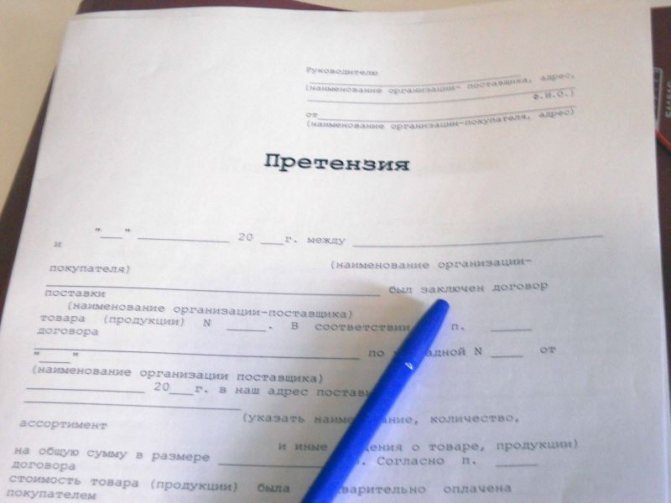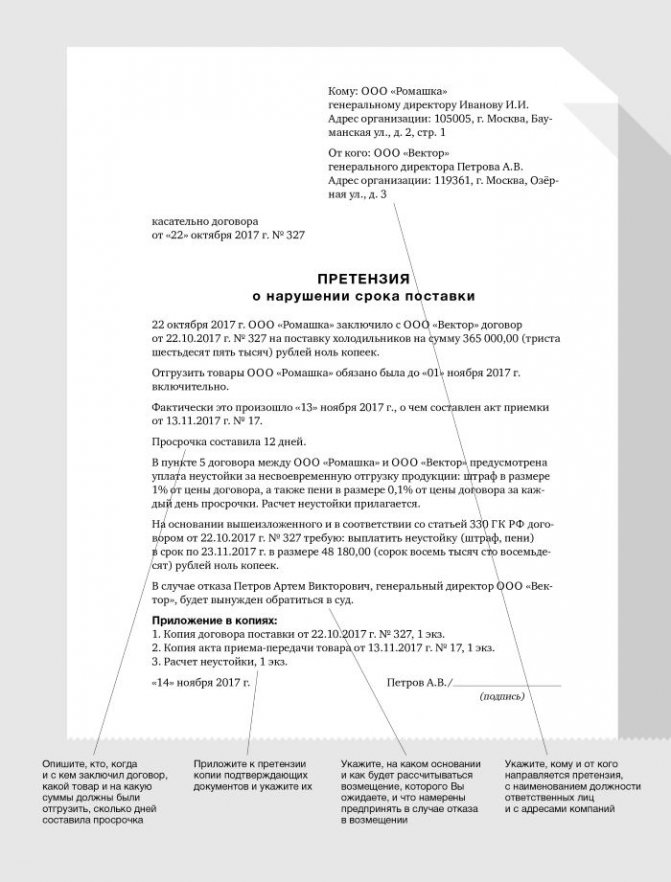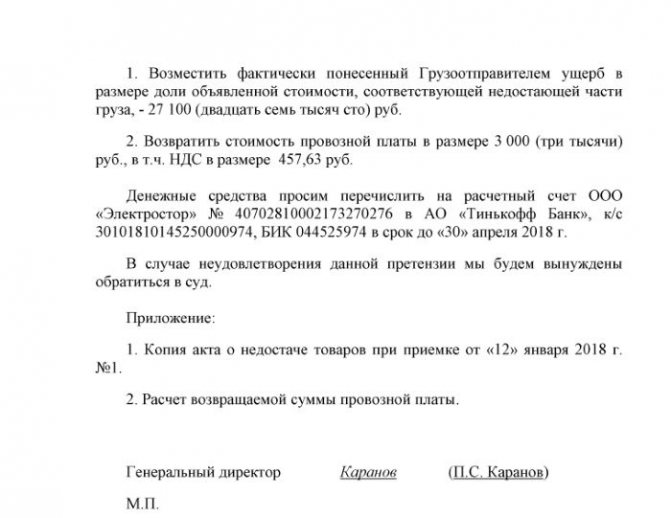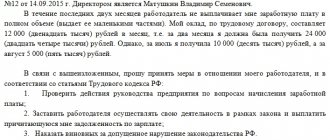Law firm Shmeleva and Partners
Civil law
16 972
What to do if the supplier has not delivered the goods? When goods are not delivered by the supplier, the injured party needs legal protection. Only in 20% of cases can such a situation be resolved in a pre-trial claim procedure. In the rest, protection of rights in court is required.
Experience knows many cases when an agreement is concluded, money is paid, but the goods are not delivered or are delivered, but with violations of the terms. Organizations and private entrepreneurs enter into a large number of agreements providing for the purchase of large volumes of products.
At the same time, the damage can be quite significant. Since the buyer may have obligations on loans to third parties. Therefore, it is extremely important to decide what to do if the supplier has not delivered the goods at all or is delaying delivery times.
In the article you will learn:
- what to do if the goods are not delivered and what regulations govern the protection of violated rights;
- how to protect your rights in case of violation of the terms of delivery of goods: terms, defects, shortages;
- what is the difference between damage and penalty, how to calculate and collect them;
- how to file a claim for violation of the terms of delivery of goods, and where to send it;
- what are the requirements for a statement of claim, and how to draw it up correctly;
- how rights are protected in court if the supplier does not deliver the goods or delivers the goods in violation of the terms of delivery;
- Is it possible to recover money for undelivered goods without a contract?
Also, do not forget that the legal office provides legal services for business. You can get a free consultation with a lawyer on any legal issue that relates to business activities:
To get a consultation
*consultation is provided free of charge only for business owners or managers.
What to do if the goods are not delivered - how is the protection of buyer rights regulated?

According to Art. 506 of the Civil Code of the Russian Federation, a supply contract is an agreement according to which an entrepreneur (seller) transfers certain goods to the buyer within a specified time frame so that he can use the products for business purposes that are not related to personal, household, household and family use. All disagreements within the framework of the transaction can be resolved peacefully through negotiations and proposals to change the conditions. The parties are given thirty days to agree on new provisions of the contract.
Delivery of products is carried out by methods of shipment or transfer to the recipient. Everything is discussed in the contract, and in its absence, the parties orally.
The second option is considered less reliable, since if the organization did not deliver the goods under such a transaction, it will be much more difficult to recover losses from it. But, nevertheless, it is still possible.
Conditions for transfer of goods may vary. The parties agree on delivery dates, can establish its frequency, and even determine the possibility of early receipt of products. However, along with this condition of the transaction, some problems arise. About a third of the cases show that the buyer suffers losses because the goods are not delivered within the time frame agreed upon with the seller.
When the supplier fails to deliver the goods or delivers them in violation of the terms of delivery, the other party has the right to unilaterally terminate the contract and recover damages. This may happen in the following situations:
- transfer of goods that have defects recognized as irreparable, which does not allow the product to be used for its intended purpose;
- violation of delivery deadlines, if this has been recorded repeatedly.
The seller may under-delivery the goods or not deliver them to the recipient at all. All this entails losses. The buyer may demand their reimbursement.
A special place is occupied by lost profits in the supply agreement. The buyer may lose the opportunity to purchase products from a particular seller due to the fact that the latter has violated the terms of the transaction.
Accordingly, the entrepreneur will be forced to purchase goods from another subject of legal relations. If in this case an amount greater than that provided for in the first contract is spent, then through the court or by filing a claim, the buyer has the right to compensate for lost profits by proving the existence of a difference in the price of the product.
We should also not forget about transactions concluded in accordance with Federal Law No. 44-FZ, which provides for the process of purchasing large quantities of goods. Relations in this case are regulated by a contract, the terms of which are determined by a notice of the possibility of the entrepreneur participating in the process of identifying a seller for a specific buyer.
Requirements for the timing and quantity of products to be delivered are set by the customer when submitting an application.
In addition to damages for non-fulfillment of the contract, liability measures such as penalties and fines are provided.
When should the goods arrive
When purchasing products remotely (via the network, mail, etc.) or directly in the store, you sign a sales contract with the employee. But this does not mean that you draw up an agreement on three pieces of paper and sign it everywhere; in this situation, a check can become an agreement.
ATTENTION! A sales receipt, or a strict reporting form. Any of these documents in your hands will be considered confirmation of payment for the goods and the conclusion of a purchase and sale agreement with the store.
If you paid with a bank card and you are afraid that you don’t have a receipt on hand, then some banking organizations provide the opportunity to print any purchase receipt directly in your personal account via Internet banking.
You can also order an account statement from a banking institution, which records all the manipulations on the movement of money, then the problem is solved, from this document you can find out where and what you spent your savings on. This extract is included in the official documentation and can be used as evidence.
Now about the most important thing. According to Art. 23.1 of the “ZPP Law”, when concluding an agreement, you must be given information (preferably in writing) about the timing of the transfer (delivery) of the goods to you. If the seller does not provide you with the goods within the stated period, then this is an offense.
So, when purchasing, you should be given information about when the products should be delivered.
The goods were not delivered on time - violation of delivery conditions

If the supplier does not deliver the goods on time, then the buyer has direct grounds to file a claim regarding failure to fulfill the terms of the agreement or contract. The period of transfer of products is the most controversial point in such legal relations.
To compensate for losses incurred, you will have to take many actions, in particular, prove the fact that the goods were not delivered on time and this caused the damage.
The Civil Code of the Russian Federation, as well as Federal Law No. 44-FZ (paragraph 7) provide for the possibility of unilateral refusal of a transaction, which allows you to legally terminate legal relations and find another counterparty.
In this case, it is allowed to charge penalties and fines as measures of liability for non-compliance with the terms of the agreement (contract). Similar sanctions apply to violation of deadlines. It is time delays that cause big losses.
An important point in such situations is the evidence base. All actions must be documented. Applications, payments, the agreement or contract itself - all this must be presented in the event of an attempt to force a conflict resolution.
At the same time, not only buyers, but also sellers are at risk. For example, a supply agreement has not been concluded, the goods are delivered but not paid for. Here you will need to establish the fact of transfer of products.
While in cases where the paid goods were not delivered, you need to confirm the transfer of funds. Therefore, it is necessary to save all documents, ensure that they are drawn up correctly and signed in a timely manner.
If a violation of the terms of delivery has nevertheless been established and proven, then it is necessary to proceed to presenting demands to the seller. There is no need to immediately contact the courts.
The initial and mandatory step is a claim. The requirement to comply with pre-trial order is enshrined both in the Arbitration Procedure Code of the Russian Federation (Article 148) and in the provisions of Art. 34 Federal Law No. 44-FZ on procurement.
How to spell together or separately Unforeseen?
Barabash Olga Vladimirovna, Penza, Russia. An important requirement for the text of a legal document is compliance with the correctness of speech - a communicative quality that presupposes, first of all, adherence to the norms of the modern Russian language. The correct use of linguistic means in the text of a legal act is an indicator of the culture of speech of its author, as well as a guarantee of the effectiveness of legal regulation in the relevant area.
WATCH THE VIDEO ON THE TOPIC: Russian language. What (would) be united or separate?
Damage and penalties under the supply contract

The occurrence of losses as a result of failure to fulfill the terms of the agreement for the supply of products is obvious. The buyer may lose time and not carry out the business activity for which the order for a particular product was placed. In this case, both real damage and lost profits are formed.
The situation is more complicated with penalties. It is subject to recovery in case of non-compliance with the terms of the contract (delay, short delivery of goods, etc.).
Its size is determined either directly by the agreement or by law (Article 330 of the Civil Code of the Russian Federation). To collect a penalty, it is necessary to confirm the fact of violation of the terms of the transaction.
Calculation of the penalty is not always possible. Two variants of events are determined, to which, according to Art. 395 of the Civil Code of the Russian Federation includes the following:
- the contract does not contain provisions on the amount and collection of penalties, which involves compensation for losses and calculation of interest, but subject to their preliminary proof;
- in the event that the agreement does not provide for the collection of interest for late payments, the buyer does not have the right to demand their compensation, even if the seller did not comply with delivery deadlines, transfer of documents and other violations.
However, in situations where a penalty is expressly provided for by law under specific circumstances of delivery, its collection is possible in court.
For example, if the supplier of goods under the contract fails to meet deadlines in accordance with Art. 34 Federal Law No. 44-FZ will be obliged to reimburse interest for lateness, even if the agreement between the parties does not provide for this.
In court proceedings, the issue of recalculating penalties and interest often arises. According to Art. 333 of the Civil Code of the Russian Federation, the court has the right to independently reduce the amount of recovery. In terms of losses, this happens extremely rarely.
If the calculation of damage is beyond doubt and is supported by relevant documents, then its amount will remain unchanged. With a penalty everything is different. It is necessary to prove that the interest is proportional to the actual losses incurred.
Thus, protecting the interests of the company acting as the buyer under a supply agreement by collecting penalties and damages is not always possible.
If losses are covered upon their occurrence, with a real loss of money, then interest on late payment is an abstract concept and is not always fixed, both in the agreement and in the law.
You can contact us for the correct formation of claims and calculations of losses/penalties. Please note that legal services provide services WITHOUT full prepayment. You can find out more at a free consultation:
To get a consultation
Emphasis on the word underdelivery
This Word edit suggests splitting. Just like “undelivered goods” and “improper performance of an obligation.” These are terms from the Civil Code of the Russian Federation, there is no need to distort legal vocabulary! Article Conclusion of an agreement for the supply of goods for state needs 4. The party that has received a signed draft agreement for the supply of goods for state needs with a protocol of disagreements must, within thirty days, consider the differences, take measures to agree on the terms of the agreement with the other party and notify the other party of the acceptance of the agreement in its edition or about rejection of the protocol of disagreements. Unresolved disagreements may be submitted by the interested party to the court for consideration within thirty days.
What to do if the goods are not delivered - we draw up and send a claim

If the supplier has not delivered the goods, what to do is determined by procedural legislation. It is necessary to prepare supporting documents and file a claim. The document must include a number of basic information, regardless of the circumstances of the violation of agreements.
These include the following:
- the circumstances of the dispute, the conclusion of a contract or agreement, the conditions that were violated by the supplier as part of the agreements, as well as the requirements of the buyer;
- the period for eliminating violations, which is not regulated by law, in practice is no more than ten days;
- the consequences of failure to comply with the buyer’s requirements, which include not only fines, penalties and penalties, but also the possibility of filing a lawsuit and forced recovery of damages.
The claim is completed with the signature of the seller (the head of the organization, a private entrepreneur), a seal and the date of preparation. From the moment the document is received, the deadline for fulfilling the requirements will begin to count. If the supplier refuses to eliminate the violations, then legal action may be taken.
When it comes to contracts that are violated due to late delivery of goods, the claim procedure is not just an obligation, but involves punishment of the buyer in accordance with Art. 7.32 of the Code of Administrative Offenses of the Russian Federation, if the demand is not sent to the counterparty.
We do not attach a general sample claim, since there is no legally prescribed form. The rules for drawing up a claim may vary in terms of content, depending on the reason for sending the document. To clarify the procedure, several basic situations need to be considered.
Delivery of goods outside the deadline

Sample claim for violation of delivery deadlines
When the seller did not deliver the goods, the claim must record all the circumstances of the case. Products do not always reach the customer in full. Often only the delivery time is violated. That is, the goods were delivered, but late.
To confirm this fact, you will need to have correspondence of a claim nature, or other information confirming negotiations on the issue of delivery, as well as acts of acceptance and transfer of products, where the actual date of fulfillment of obligations will be determined.
If the company did not deliver the goods on time, but in the end it was still delivered, then in accordance with Art. 405 of the Civil Code of the Russian Federation, the buyer has the right to demand compensation for losses, namely, to collect a penalty in the amount established by the contract or agreement.
In this regard, a claim is also sent in writing. In the situation under consideration, it is necessary to have a detailed calculation of the amount of collection, its grounds and details, so that the counterparty can fulfill the requirements on time. It is also necessary to indicate the period during which the funds must be transferred.
Once the complaint is received and reviewed by the supplier, the buyer can determine the next course of action.
Several situations are possible:
- The seller accepts the claim and agrees with the demands made.
In this situation, a response is sent to the buyer and funds are transferred. The dispute with the supplier ends peacefully.
- The supplier refuses to pay the penalty, but admits that the goods were not delivered on time.
In this case, a bank guarantee and funds transferred to secure the contract can help. You will also have to submit a claim.
If the terms of the guarantee are not specified in the contract, the supplier can go to court and challenge the actions of the counterparty. That is why all decisions must be recorded on paper, including the claim procedure.
- The seller does not deny the fact of violation of delivery terms, but does not agree with the amount of the penalty.
Only the court can help in this matter. It is the authorized body that recognizes the calculation of the penalty as unlawful.
To do this, the seller will need to prove that the violation of deadlines arose through the fault of the customer himself.
At the same time, the buyer can also seek forced recovery of damages through the court, even if the supplier does not agree with them.
Payment of the penalty presupposes that the seller fulfills his obligations, but only on the condition that the goods were delivered despite the violation of deadlines. As soon as the money arrives in the buyer’s account, he is obliged to pay for the products received.
Thus, late delivery of goods does not always imply unilateral termination of the transaction. If the parties can agree peacefully and cover the losses incurred, then in the future the terms of the agreement can be fully implemented. However, the party will receive the necessary products, and the other will receive payment for its delivery.
Product not supplied by supplier
Experience knows cases when the goods are not delivered at all. That is, the seller does not recognize the customer’s losses and claims that the products were delivered to him.
In this case, after sending a claim, to which in most cases the counterparty does not respond or refuses all the claims presented, the agreement can be terminated unilaterally.
After a decision is made to terminate all agreements, the obligated person is given ten days to fulfill his obligations under the transaction.
That is, according to the law, the maximum amount of time is allocated for delivery of goods or compensation for losses. If the seller does not deliver the goods and the buyer terminates the contract, then the contractor ends up in the RNP (register of unscrupulous suppliers).
If termination of the contract results in damage to the buyer, then he is given the right to recover damages from the supplier. First, a written claim is sent with an estimate of the damage, the grounds for the claims and the deadline for fulfilling the obligations.
Compliance with pre-trial order is mandatory. If the seller does not respond to the buyer’s demands, then compensation can only be made through the judicial authorities, which will force the violator of the terms of the transaction to transfer funds in accordance with a reasonable calculation of the penalty, damage caused, and penalties.
You can download: Sample complaint to supplier for non-delivery of goods
Shortage of goods - the goods were delivered with a shortage

The goods were delivered with a shortage - sample claim
Contracts and delivery agreements may involve the receipt of goods in several shipments. Even if it was agreed to deliver the products at one time, but for some reason the process had to be divided into several stages, the buyer is obliged to accept the order. The exception is when the agreement expressly prohibits the delivery of goods in parts.
When the goods are not delivered according to the supply contract or the delivery deadline is not met, you must immediately file a claim. The shortfall in product range is made up for by additional supplies. That is, the seller can deliver the goods if something was missing within the framework of a specific application.
This is not a basis for forced collection of penalties and interest. However, if the delay still causes material harm to the buyer, then the conflict will need to be resolved, especially if the seller does not intend to refuse to deliver the goods and has a justification for his delay.
It is necessary to distinguish between short delivery, that is, the division of one act of transfer of goods into several, but without violating the terms of the agreement, and real delay, due to which, due to the lack of necessary products, the buyer suffers losses. Only in the second case is claim work necessary.
Thus, drawing up and submitting a claim is mandatory if the goods are not delivered according to the agreement. At the same time, claims can be made only if there is real damage. If no damage is caused to the buyer, and the seller does not refuse to fulfill his obligations, but is only delayed, then the only monetary recovery that is possible is a penalty.
You can fill out a claim using the link: Sample claim for delivery of goods with shortage
Goods not delivered - judicial dispute resolution procedure

Any supply agreement (contract) provides for a procedure for resolving disputes when the claims procedure does not help. In the case of legal entities and entrepreneurs, such a means of resolving the dispute is an appeal to the arbitration court with a statement of claim.
To do this, you will need to create a reliable and substantiated evidence base and transfer all documents relating to the transaction:
- supply agreement;
- acts of acceptance and reconciliation;
- money orders;
- calculations of losses/penalties;
- and so on.
The court can have a significant impact on the supplier by forcing him to pay damages and penalties, including by transferring documents to initiate enforcement proceedings.
Therefore, in order for the claim to be satisfied, it is necessary to comply with the conditions of procedural legislation, in particular on the issue of drawing up an application and forming an annex to it.
Several stages of applying to the arbitration court are defined in a situation where the goods are not delivered on time or at all.
Collection of documents for presenting requirements to the supplier
The first step is collecting documents, the list of which includes the following:
- an agreement or contract confirming the existence of relations and obligations under the transaction; if such documents are missing, then other confirmation of the agreement will be required (receipts, payment orders, etc.);
- detailed calculation of losses (penalties), which must be presented in the form of a separate document, certified by the signature and seal of a legal entity (entrepreneur);
- information establishing the fact of fulfillment of obligations on the part of the plaintiff, that is, the buyer (payment for the goods or part thereof), or documents confirming the violation of the terms of the transaction by the defendant seller;
- confirmation of the grounds for filing a claim (for example, an acceptance certificate showing that the delivery was made late, and therefore damage to the plaintiff arose);
- a claim confirming compliance with the pre-trial procedure, a response to it (if any) and a receipt establishing the fact that the document was sent to the defendant;
- a receipt for payment of the state duty, determined according to the price of the claim, that is, the amount of the claims submitted in accordance with the Tax Code of the Russian Federation;
- a document establishing the fact of sending or personally transferring the second copy of the claim to the defendant seller.
The package of documents can be extensive. In each specific case, depending on the nature of the transaction, different information may be sent.
For example, if the supplier did not deliver the goods and the buyer suffered losses, then it is enough to confirm the fact of the conclusion of the transaction (agreement or contract), establish attempts to resolve the dispute and come to an agreement (claim, business correspondence) and calculate the amount of recovery.
All other aspects can be covered by the defendant if he tries to object to the counterparty’s claims. The burden of proof lies on both sides. The plaintiff must provide the grounds for filing a lawsuit, and the defendant must justify the failure to fulfill obligations. A passive position does not benefit the parties to the dispute.
The goods were not delivered - we draw up and submit a statement of claim
If the documents are prepared, then you need to file a claim. This is done in accordance with the requirements of procedural legislation. It is necessary to pay attention to the content of the document, its validity and comprehensiveness.
In this case, the application is drawn up in simple written form, transmitted in person, by mail or through electronic resources. Arbitration courts can consider a dispute in absentia, which involves conducting the entire process through the official website of the authority.
The condition for consideration in absentia is the price of the claim; it should not exceed 200 thousand rubles.
Filing a claim is an important process. Compliance with the terms of the law is necessary. Even at the initial stage, the application may be returned, left without movement or consideration.
That is why you will need to carefully approach the process of forming a claim. It doesn’t matter if lawyers help with this, in-house or outside.
The main thing is not to try to draw up a statement of claim yourself, relying on data from the Internet. They may not be accurate or you may misinterpret them.
The specialist knows exactly which legal norms to refer to when covering a specific situation, and will create an attachment to the application in accordance with the requirements.
For assistance in drawing up a statement of claim, as well as protection of interests in arbitration court by a lawyer until the result is achieved, you can contact:
Send a request
*We are confident in the quality of our services, so cooperation with us means a minimum of risks for you. Since we provide legal services for business WITHOUT full prepayment.
Compensation for damage resulting from the lack of delivery of goods occurs according to the general rules of the Civil Procedure Code and the Arbitration Procedure Code of the Russian Federation. The court makes a decision during the proceedings, which lasts up to two months, in rare cases extended by a month. After which the parties have the opportunity to appeal the verdict.
One month is allocated for this. It will no longer be possible to change the decision. Forced recovery of losses under a supply agreement is also carried out according to the rules of enforcement proceedings; arrest may be imposed on all property of a legal entity or entrepreneur acting as a seller.
Separately, it should be said about the need to participate in trials. Since we are talking about business representatives, it is better to involve attorneys - lawyers who can defend the interests of the organization in court.
It is not worth ignoring subpoenas or taking a passive position, silently agreeing with the counterparty’s arguments. Every doubt of the court can be considered in favor of the party that was able to substantiate its position.
Requirements for filing a claim
The first step to success in litigation is a well-drafted statement of claim. Organizations that do not have lawyers on their staff are forced to turn to third-party specialists, which is right.
Independent attempts to formulate a justified and legally competent statement in practice end in failure.
If the terms of delivery of goods are not met, the claim on the part of the buyer will not have any fundamental differences in comparison with other controversial situations requiring judicial consideration. The first condition is the reflection in the claim of the nature of the dispute, the grounds for recovery and information about the entrepreneurs.
According to the general rules of civil legislation (Article 131 of the Civil Code of the Russian Federation), as well as certain situations from practice, it is necessary to indicate the following information in the claim when trying to recover damages for failure to fulfill an agreement on the supply of products:
- the name of the arbitration court indicating the region where the claim is sent (the body is determined by the location of the defendant or the place where the supply agreement was concluded);
- information about the plaintiff-buyer of the goods, since this is either an organization or an individual entrepreneur, then in this case the full and abbreviated name of the person, his legal and actual address, contact details, INN, OGRN, KPP, as well as details for transferring funds are indicated;
- information about the second party to the dispute – the defendant-seller, which is identical to the information provided about the plaintiff;
- the price of the claim and the amount of state duty paid, which can also be recovered from the defendant as legal expenses when the claim is satisfied (information is indicated in the header of the document);
- the circumstances of the legal relationship, the date of conclusion of the contract, the terms of delivery under the transaction, a description of the nature of the violation of the agreement by the defendant;
- grounds for going to court, reference to clauses of the contract or agreement confirming non-compliance with obligations;
- explanation of the evidence presented reflecting payment for the delivered goods, its acceptance or the seller’s direct refusal to deliver in business correspondence, and so on;
- references to legal norms that allow you to go to court and demand compensation for losses and payment of penalties;
- an indication of the calculation of losses to be recovered due to the fact that the goods were not delivered;
- the plaintiff’s claims providing for the recovery of damages, penalties, penalties, as well as legal expenses;
- signature of the applicant or his representative by proxy, as well as the date of drawing up the application.
The claim must include an appendix that reflects the full list of documents sent to the court along with the application.
Moreover, each party has the right to supplement information during the entire trial. The court may also request additional information if the material submitted is not sufficient to establish the truth.
You can file a claim using the link: Statement of claim for recovery of the cost of paid but not delivered goods
Thus, violation of the terms of the supply contract by the seller may lead to a judicial settlement of the dispute and forced recovery of damages.
The buyer may suffer losses if the product is not received on time, or a penalty if the fact of delay is recorded. However, before protecting interests in court, it is necessary to go through a claim procedure, which allows you to save time and money on resolving the dispute between the parties to the relationship.
If you need the help of a highly qualified lawyer, then contact the legal department. The first consultation, assessment of the situation and forecast of the success of the case is provided free of charge.
Get legal help
*Read honest reviews about legal work.
Legal article from:
Does the buyer have other ways to protect his rights other than court?
The actions of a supplier who received money and did not deliver the goods can be recognized as fraud (Article 159 of the Criminal Code of the Russian Federation), if the supplier initially did not have the intention to supply anything, that is, there was intent to commit a crime.
But this is a theory. In practice, convincing law enforcement agencies to open a case is not an easy task.
. In such cases, the applicant is sent a standard refusal to initiate a case with the wording “civil legal relations have developed between the parties, which, in accordance with current legislation, are authorized to be considered by the courts of the Russian Federation.” “Near-legal” methods of “persuasion” will be required.
So recourse to arbitration court is the most effective and accessible means of protecting the rights of the buyer
who paid but did not receive the goods.







